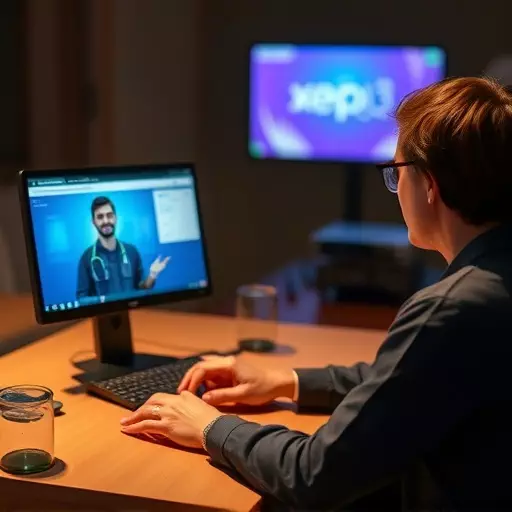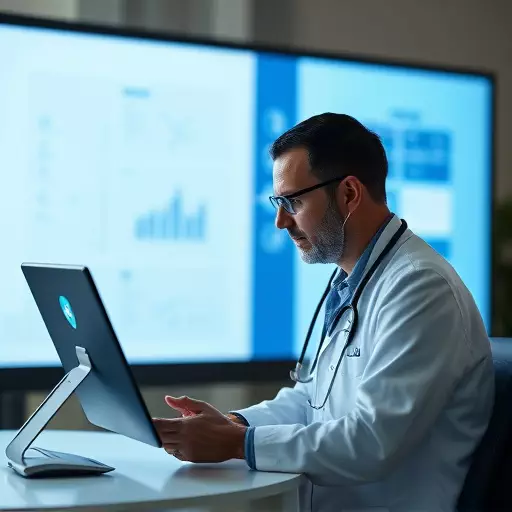In recent years, Telehealth for Ozempic users in Ann Arbor has emerged as a game-changer in healthcare delivery. Powered by AI advancements in GLP-1 therapy personalization, it offers tailored treatments and improved blood sugar control. This convenience allows residents to receive expert guidance from home, revolutionizing diabetes management. Predicting global adoption of Ozempic telehealth services is promising due to the growing acceptance of digital healthcare solutions, aiming for more accessible and high-quality personalized care worldwide. Integrated health records further enhance this trend, merging patient data for precise diagnoses and tailored treatment plans through AI-driven personalization.
The integration of health records and telemedicine is reshaping healthcare, especially for chronic condition management. This article delves into the promising future of Ozempic users, exploring how telehealth consultations in Ann Arbor powered by AI advancements in GLP-1 therapy personalization are transforming care. We analyze global trends predicting the future adoption of Ozempic telehealth services, while dissecting the benefits and challenges of integrated health records. By looking ahead, we envision enhanced patient care through advanced technology.
- The Rise of Telehealth for Ozempic Users in Ann Arbor
- AI-Driven Personalization: Revolutionizing GLP-1 Therapy
- Global Reach: Future Adoption Trends of Ozempic Telehealth Services
- Benefits and Challenges of Integrated Health Records
- A Look Ahead: Enhancing Patient Care with Advanced Technology
The Rise of Telehealth for Ozempic Users in Ann Arbor

In recent years, Telehealth for Ozempic users in Ann Arbor has emerged as a game-changer in healthcare delivery. With advancements in technology and AI, patients now have access to personalized consultations from the comfort of their homes. This shift towards digital healthcare is particularly beneficial for those managing conditions like diabetes, where regular monitoring and adjustments are crucial. The convenience of telehealth Ozempic consultations allows users in Ann Arbor and beyond to receive expert guidance without the need for physical visits.
AI-driven systems are revolutionizing glp-1 therapy personalization, ensuring that treatment plans for Ozempic users are tailored to individual needs. As a result, patients can expect improved outcomes and enhanced quality of life. Predicting future global adoption of telehealth services for Ozempic is promising, given the growing acceptance of digital healthcare solutions worldwide. This trend is set to continue, making high-quality, personalized care more accessible to people everywhere.
AI-Driven Personalization: Revolutionizing GLP-1 Therapy

AI-driven personalization is poised to revolutionize GLP-1 therapy, such as that provided through Ozempic consultations in Ann Arbor and beyond. By leveraging advancements in artificial intelligence, healthcare providers can tailor treatment plans to individual patient needs, preferences, and response histories. This level of customization has the potential to significantly enhance therapeutic outcomes while also improving patient adherence and satisfaction. AI algorithms can analyze vast amounts of data, including genetic information, lifestyle factors, and real-time health metrics, to predict how a patient might respond to Ozempic and other GLP-1 therapies.
The future global adoption of telehealth services for Ozempic and similar treatments looks promising. As technology continues to evolve and healthcare systems become more digitally integrated, personalized AI-driven care could become the norm rather than the exception. This shift would democratize access to specialized diabetes management, allowing patients worldwide to benefit from precise, proactive treatment strategies tailored specifically to their unique circumstances.
Global Reach: Future Adoption Trends of Ozempic Telehealth Services

The global reach of Ozempic telehealth services is poised for significant growth, driven by advancements in AI and personalized GLP-1 therapy. As technology continues to evolve, the potential for remote consultations using telehealth platforms becomes increasingly attractive, especially for patients in rural or underserved areas. The convenience of virtual appointments, coupled with AI-powered tools, allows healthcare providers to offer specialized care regardless of geographical boundaries. This trend is further amplified by the success and increasing availability of Ozempic as a treatment option for diabetes management.
Predicting future global adoption involves understanding the current digital landscape and patient preferences. With the rise of digital health solutions, many patients are now more open to remote healthcare services. Factors such as improved internet accessibility, user-friendly telehealth applications, and effective marketing strategies will contribute to the widespread acceptance of Ozempic telehealth consultations in Ann Arbor and beyond. AI advancements in personalization ensure that treatments can be tailored to individual patient needs, making these services both efficient and effective.
Benefits and Challenges of Integrated Health Records

Integrated health records offer a multitude of benefits for Ozempic users. By seamlessly combining patient data from various sources, including telehealth consultations in Ann Arbor and treatment outcomes with GLP-1 therapy personalization, healthcare providers can gain comprehensive insights into each individual’s unique health journey. This holistic view enables more accurate diagnoses, tailored treatment plans, and improved overall care quality. With AI advancements playing a pivotal role in this integration process, personalized medicine is within reach, promising to revolutionize the way Ozempic is prescribed and managed.
However, transitioning to integrated health records also presents challenges. Ensuring data security and patient privacy remains paramount, especially as more telehealth services involving Ozempic are adopted globally. Standardizing diverse data formats and establishing seamless communication between different healthcare systems can be complex. Additionally, educating both medical professionals and patients about the benefits and proper use of integrated records is crucial for widespread acceptance and successful implementation, particularly in predicting future global adoption of Ozempic telehealth services.
A Look Ahead: Enhancing Patient Care with Advanced Technology

As we peer into the horizon, the future of healthcare appears increasingly intertwined with advanced technology, especially in managing chronic conditions like diabetes. For Ozempic users, this translates to enhanced patient care through innovative approaches such as telehealth ozempic consultations ann arbor. Artificial Intelligence (AI) advancements in GLP-1 therapy personalization promise tailored treatments, optimizing blood sugar control and reducing the burden of manual adjustments.
Predicting future global adoption of Ozempic telehealth services, we see a growing trend towards digital healthcare solutions. This shift is driven by improved accessibility, convenience, and efficiency for both patients and providers. AI-powered systems can analyze vast datasets to identify patterns and trends, enabling proactive management and improving overall health outcomes. In this evolving landscape, personalized medicine and remote care are poised to revolutionize the way we approach diabetes treatment and care.
